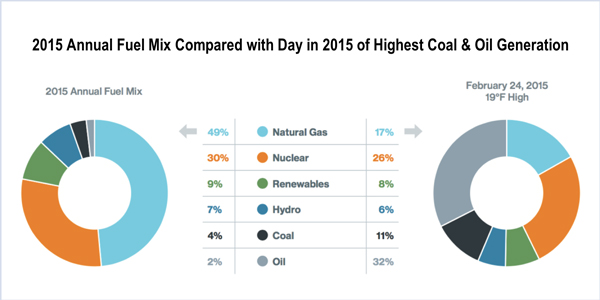By Michael Kuser
A new ISO-NE report finds that New England’s grid is vulnerable to a season-long outage of any of several major energy facilities, such as the 688-MW Pilgrim nuclear plant in Plymouth, Mass., which went offline during a recent cold snap after the loss of a power line leading to the plant.
That incident resulted in no reliability issues for the RTO.
“Maintaining reliability is likely to become more challenging, especially if current power system trends continue,” the RTO’s Operational Fuel-Security Analysis report said.
The most concerning trend: the increasing reliance on natural gas for power generation, which has led to supply constraints during times of peak load. Under normal conditions, New England relies on natural gas for about half its electric power generation, up from 15% in 2000.
The grid operator began the study in late 2016 to quantify the region’s future fuel security risk. It planned to issue the report last fall but delayed publication until the furor died down over Energy Secretary Rick Perry’s proposed rulemaking to financially support coal and nuclear generators (RM18-1). (See DOE NOPR Rejected, ‘Resilience’ Debate Turns to RTOs, States.)
“The goal was to understand the future implications of several significant trends already affecting grid operations,” ISO-NE CEO Gordon van Welie said. “The results aren’t a prediction, but they do shine a light on the potential reliability consequences of retirements of generators with stored fuels and the significance of liquefied natural gas, imports, renewables and oil inventories at dual-fuel power plants.”
The study grew out of the RTO’s experiences operating the system through challenging winter conditions and was undertaken to ensure that power plants have, or are able to procure, the fuel they need to meet demand and maintain power system reliability.
Scenarios and Risks
The study created 23 scenarios and focused on five key variables: retirements of coal- and oil-fired power plants; availability of LNG; oil tank inventories at dual-fuel generators; electricity imports from neighboring power systems; and the addition of renewable resources.
The report highlighted the concern that New England’s system reliability is heavily dependent on LNG and electricity imports. While dual-fuel capability for plants can provide a key contribution to reliability, permitting for construction and emissions is difficult. All but four scenarios resulted in fuel shortages requiring rolling blackouts, indicating the trends affecting the system may intensify the region’s fuel security risk.
RTO planners concluded that developing renewable resources could help reduce the fuel security risk but will also likely drive more coal- and oil-fired generators into retirement, requiring increased LNG imports to counteract the loss of stored fuels. At the same time, higher levels of LNG, electricity imports and renewables can minimize system stress and maintain reliability. But delivery assurances for LNG and electricity imports, and transmission expansion, will be needed to attain those levels, the report said.
Recent and impending retirements of oil, coal and nuclear power plants will translate into 4,600 MW of retirements by June 2021, representing more than 10% of the region’s total installed capacity, the report said.
The RTO noted that about 13,500 MW of new generation was in its interconnection queue as of Dec. 1.
“Proposed wind farms make up just over half the proposals, or about 7,300 MW,” the report said. “The queue also includes 1,000 MW of proposed solar (8% of the total) and 400 MW of battery storage (3% of the total). Not all these projects will be constructed; historically, about 68% of the megawatts proposed are never built.”
Massachusetts Sierra Club Director Emily Norton took issue with those numbers.
The report “inexplicably underestimates the amount of renewable energy — i.e. solar and wind — that we know will be coming online in coming years,” Norton said in a statement.” Yet even a report rigged against clean energy shows that New England can affordably and reliably replace most of its old, dirty, dangerous and uneconomic power plants without spending billions of dollars on unnecessary gas pipelines.”
ISO-NE plans to discuss the results of the analysis with stakeholders, regulators and policymakers throughout 2018 to determine the level of fuel security risk they are willing to tolerate.






